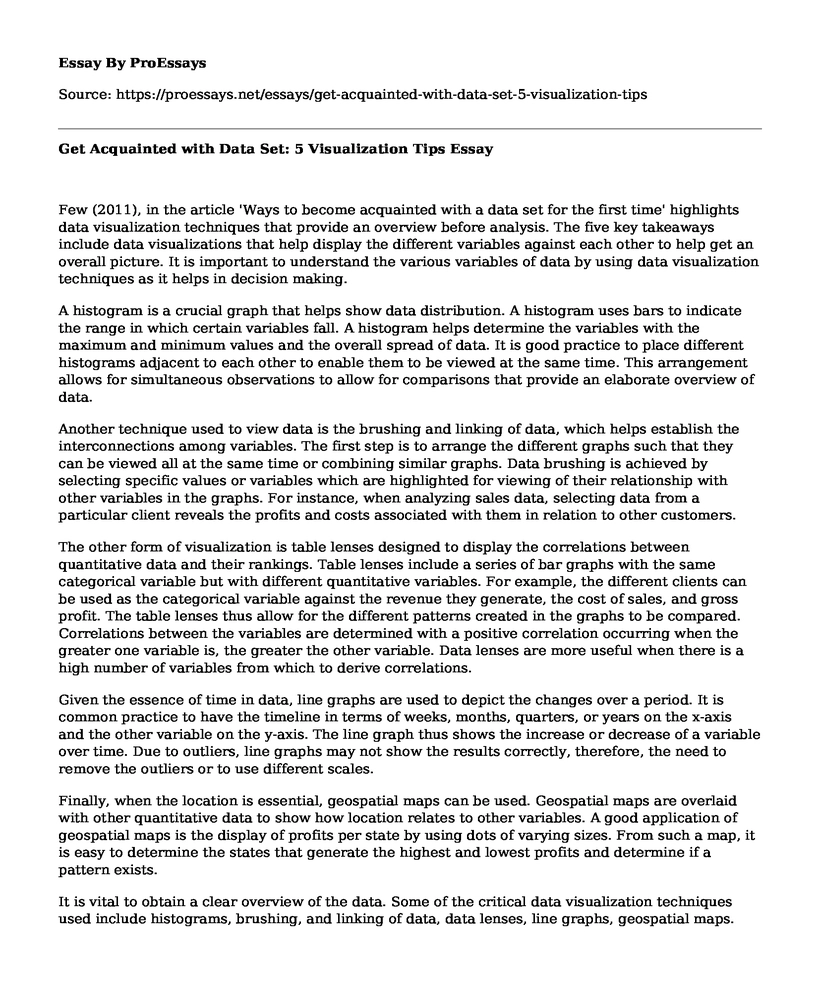Few (2011), in the article 'Ways to become acquainted with a data set for the first time' highlights data visualization techniques that provide an overview before analysis. The five key takeaways include data visualizations that help display the different variables against each other to help get an overall picture. It is important to understand the various variables of data by using data visualization techniques as it helps in decision making.
A histogram is a crucial graph that helps show data distribution. A histogram uses bars to indicate the range in which certain variables fall. A histogram helps determine the variables with the maximum and minimum values and the overall spread of data. It is good practice to place different histograms adjacent to each other to enable them to be viewed at the same time. This arrangement allows for simultaneous observations to allow for comparisons that provide an elaborate overview of data.
Another technique used to view data is the brushing and linking of data, which helps establish the interconnections among variables. The first step is to arrange the different graphs such that they can be viewed all at the same time or combining similar graphs. Data brushing is achieved by selecting specific values or variables which are highlighted for viewing of their relationship with other variables in the graphs. For instance, when analyzing sales data, selecting data from a particular client reveals the profits and costs associated with them in relation to other customers.
The other form of visualization is table lenses designed to display the correlations between quantitative data and their rankings. Table lenses include a series of bar graphs with the same categorical variable but with different quantitative variables. For example, the different clients can be used as the categorical variable against the revenue they generate, the cost of sales, and gross profit. The table lenses thus allow for the different patterns created in the graphs to be compared. Correlations between the variables are determined with a positive correlation occurring when the greater one variable is, the greater the other variable. Data lenses are more useful when there is a high number of variables from which to derive correlations.
Given the essence of time in data, line graphs are used to depict the changes over a period. It is common practice to have the timeline in terms of weeks, months, quarters, or years on the x-axis and the other variable on the y-axis. The line graph thus shows the increase or decrease of a variable over time. Due to outliers, line graphs may not show the results correctly, therefore, the need to remove the outliers or to use different scales.
Finally, when the location is essential, geospatial maps can be used. Geospatial maps are overlaid with other quantitative data to show how location relates to other variables. A good application of geospatial maps is the display of profits per state by using dots of varying sizes. From such a map, it is easy to determine the states that generate the highest and lowest profits and determine if a pattern exists.
It is vital to obtain a clear overview of the data. Some of the critical data visualization techniques used include histograms, brushing, and linking of data, data lenses, line graphs, geospatial maps. These tools allow for the initial understanding of data before an in-depth data analysis is conducted.
Reference
Few, S. (2011). Ways to become acquainted with a data set for the first time. Perceptual Edge. Retrieved from http://www.perceptualedge.com/articles/visual_business_intelligence/exploratory_vistas.pdf
Cite this page
Get Acquainted with Data Set: 5 Visualization Tips. (2023, Mar 27). Retrieved from https://proessays.net/essays/get-acquainted-with-data-set-5-visualization-tips
If you are the original author of this essay and no longer wish to have it published on the ProEssays website, please click below to request its removal:
- Database Security Paper Example
- Research Paper on Dynamic Web Design
- Article Analysis Essay on Wasting Time on the Internet and Is Google Making Us Stupid
- 2017 Cybercrime: Establishing a Cybersecurity Insurance Firm - Essay Sample
- Secure Healthcare Data: Protecting Sensitive Info From Breaches & Leaks - Essay Sample
- Digital Revolution Spurs Economic Growth: Legal Questions Around Culture Promotion & Protection - Essay Sample
- Paper Example on Self-Driving Automobiles: An Innovative Revolution







